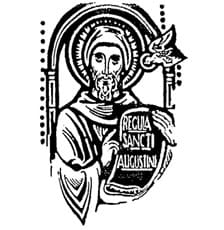Saint Augustine produced a great number of sermons. Most of them were lost. Augustine must have probably preached eight thousand sermons (according to the estimate of Hubertus Drobner), but there are just some five hundred sermons extant. In 1996, twenty-six new sermons of Augustine were discovered in the municipal library of Maguncia (Germany). These sermons were named after Dolbeaux who discovered the said discourses. Now six other sermons were discovered in a twelfth century manuscript in the library of the University of Erfurt (Germany) by three scholars from the Austrian Academy of Sciences, namely: Isabella Schiller, Dorothea Weber, and Clemens Wiedmann. The manuscript was part of the collection donated to the Collegium Amplonianum in Erfurt by the the German Theologian Amplonius Rating. The scholars were able to identify the sermons in the manuscript Dep. Erf. CA 12th 11 based on the list of sermons of Augustine redacted by Possidius.
Charity, almsgiving and martyrs
Four of the six newly-discovered sermons are unknown, and the other two are only known in part. Three of these unknown discourses speak of charity and almsgiving. The other two sermons are associated with the feasts of martyrs: one is dedicated to Saints Perpetua and Felicity who were so popular in Carthage, the place of their martyrdom, and the other to Saint Cyprian. In these two sermons, Augustine bewails the behavior of the faithful during the celebration of the feast. At that time, it was customary to visit the memoria martyrum and the sanctuary of the relics of martyrs, and there was a depraved practice of getting drunk to venerate Saint Cyprian. The last of the six sermons talks about the resurrection of the dead. These sermons are published in the Austrian journal Wiener Studien. Zeitschrift fuer Klassiche Philologie und Patristik und lateinische Tradition, volumes 121 and 122.
Catechesis of the Pope
Pope Benedict XVI has dedicated to Saint Augustine recently, five of the catecheses that he delivers during the general audiences on Wednesdays. Once he recalled Augustine’s great interest in preaching, even though Augustine might have preferred a life of recollection and prayer: "Thus, renouncing a live of complete meditation, Augustine learned, at times with difficulty, to share the fruit of his intelligence for the benefit of the rest. He learned to communicate his faith to simple people and to live out that faith, forming untiringly a generous and heavy activity that the Saint of Hippo describes in one of his most beautiful sermons: "To preach, discuss, reprimand, build, and to be at the disposition of others is an enormous responsibility, a heavy load, an immense task." But Augustine, as the Pope concludes, took upon himself that responsibility, knowing that in doing so, he could be closer to Christ…"


